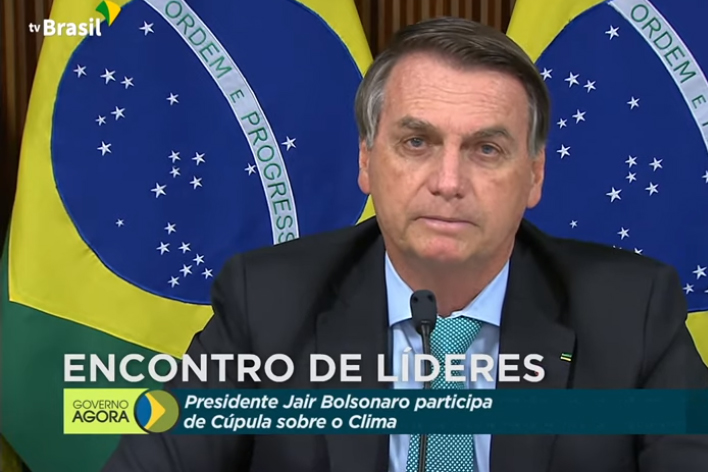Brazilian commitment at Climate Summit contradicts domestic policy
Bolsonaro pledges to end illegal deforestation, but does not signal a shift in environmental and indigenous protection policies

In a speech on the morning of Thursday, April 22, at the Climate Summit organized by the US President Joe Biden with world leaders to discuss measures to combat climate change, President Jair Bolsonaro reaffirmed Brazil’s commitment to end illegal deforestation and cut carbon emissions by 50% by 2030.
The promise, however, contradicts a series of domestic policies that have led to the dismantling of environmental protection agencies in Brazil since the start of the Bolsonaro administration, as well as attacks against native and riverside populations.
According to Julia Neiva, coordinator of the Development and Socioenvironmental Rights program at Conectas, from day one the Bolsonaro government has done its utmost to destroy environmental and social protection policies, while adopting racist slurs that encourage violence against indigenous peoples, quilombola communities and other riverside populations who are recognized as the main custodians of the forests.
“We need to remember that during his government we have seen record levels of fires and deforestation, and legislative bills that pose a threat to the very survival of native peoples, such as those that alter environmental licensing laws and that allow mining on indigenous lands,” said Neiva. “Climate racism is how this government operates. Unlike what was said today, his policies and speeches have further aggravated the climate crisis,” she added.
When elected, Bolsonaro announced that his government would not demarcate an inch of indigenous land – a promise he has kept so far. Last September, in his opening speech at the UN General Assembly, the president blamed indigenous peoples for the fires in the Amazon and the Pantanal.
Record deforestation
Deforestation in Brazil in March 2021 was the highest recorded for the month in the past ten years. According to data from Imazon (Institute of the People and Environment of the Amazon) obtained by SAD (Deforestation Warning System), a total of 810 km² of forest was felled in March, an area slightly larger than the city of Goiânia. The amount is 216% larger than the figure registered in March 2020 and the highest for the month since records began in 2011. From January to March 2021, some 1,185 km² was deforested – twice as much as last year.
According to Neiva, these numbers are partly the result of the disruption of Brazilian climate policy mechanisms. Since the start of this government, the Ministry of the Environment has abandoned the National Fund on Climate Change – one of the main sources of funding for the fight against global warming in the country.
“Cases in the Supreme Court have claimed accountability from government for this omission and civil society has argued that Brazil not only needs to be more ambitious with its climate targets, but it needs to take into consideration that the climate crisis is also a human rights emergency,” concluded Neiva.


